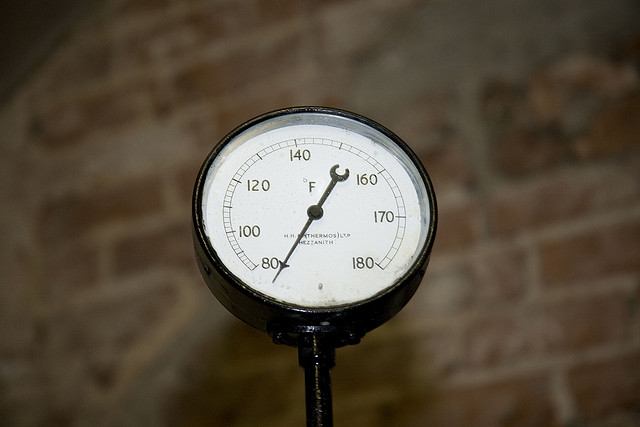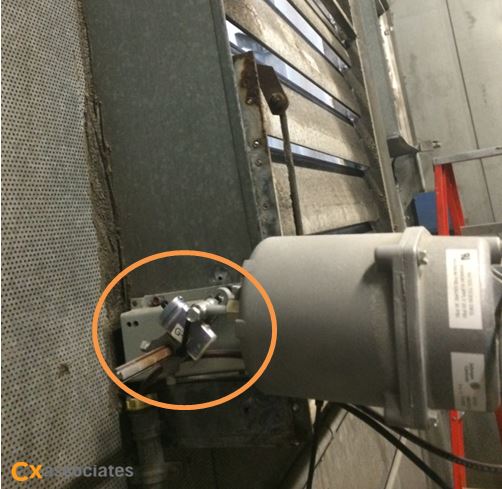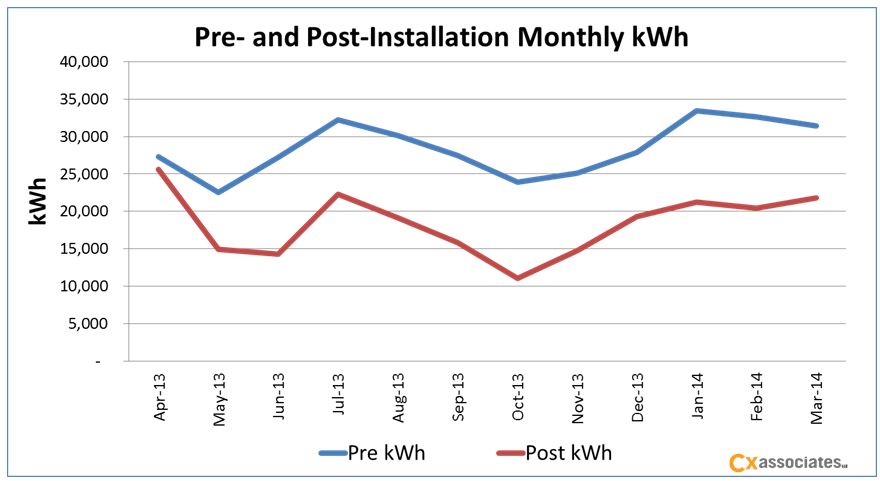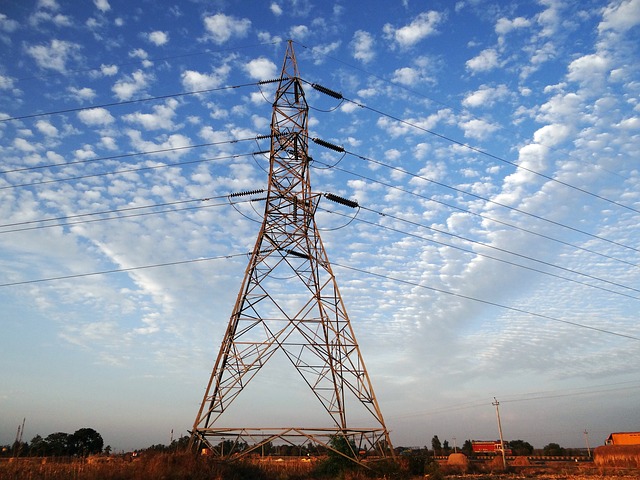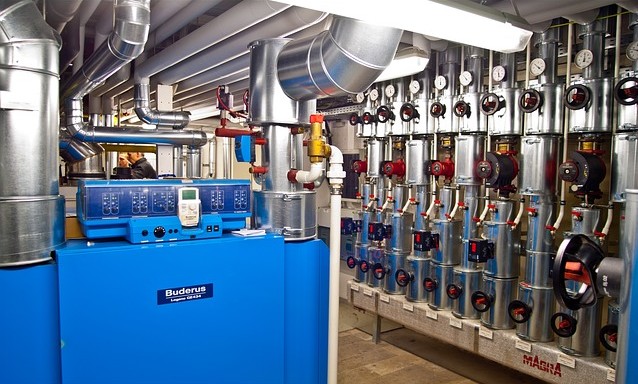Retrocommissioning (RCx) is a great way for facilities owners and managers to improve energy efficiency and performance of existing building systems without incurring large capital costs. Some projects result in such great savings that simple payback can be less than a year. The RCx process involves assessing the operating performance of existing equipment in a facility, and then making recommendations to improve the performance based on the results of the assessment. These improvements are typically done by making adjustments to how the equipment is controlled.
2 min read
Chillers Offer Big Savings with Retrocommissioning
By Walker Calderwood on Mar 18, 2015 6:00:00 AM
Topics: Building Cx & Design Review Energy Efficiency
4 min read
How to Get the Most from Your Building Using Energy Metering
By Katie Mason on Mar 11, 2015 6:00:00 AM
Today there are a multitude of energy metering devices, (or data loggers), available to enable the analysis of building systems functionality. There are many different types of data loggers, each with a different purpose. To get the most from your building using energy metering, you need to narrow your options with your overall goals in mind. Before we install meters on a system, whether it’s an electrical system, HVAC system, or domestic hot water system, we first determine what type of data we need and what the data will be used for. With this information, we put together a metering plan that will produce the data necessary for the analysis. For this blog post, I am going to provide two specific examples of systems/equipment we metered, including why we were performing the metering, how we did it (what types of meters), and what the findings were. Both of these examples showed the equipment being metered was not working as intended.
Topics: Building Performance & Technology Evaluation Measurement & Verification (EM&
5 min read
How to Retrocommission Fan Systems for Sweet ROI
By Matt Napolitan on Mar 4, 2015 5:00:00 AM
A good retrocommissioning (RCx) project will result in at least one of the following:
Topics: Building Cx & Design Review Building Performance & Technology
3 min read
How to Increase Adoption of Retrocommissioning Through Energy Efficiency Programs
By Jennifer Chiodo on Feb 25, 2015 5:00:00 AM
The number one barrier to retrocommissioning is the upfront cost of the engineering study. In general, building owners cannot easily determine the potential value of such studies or understand the quality and content that is necessary to support an energy efficiency investment. This makes many customers reluctant to invest $20,000-$70,000 in an engineering study.
Topics: Building Cx & Design Review Energy Efficiency
3 min read
The Retrocommissioning Process: Where To Start?
By Ben Fowler on Feb 18, 2015 5:00:00 AM
As a company that does a good amount of retrocommissioning (RCx) – the commissioning process applied to existing buildings – when taking on a new project we are often faced by a question asked by both ourselves and our clients: “Where do we start?”
Topics: Building Cx & Design Review Energy Efficiency
2 min read
Big Energy Savings from Small Building Retrocommissioning
By Eveline Killian on Feb 11, 2015 5:00:00 AM
Part of a marketing stumbling block in our commissioning field is the lack of quantifiable benefits to our work. People understand commissioning will enable their systems to work more smoothly, generating less maintenance issues and longer equipment life. People understand that commissioning will benefit their building with more comfort for their tenants and finer temperature and humidity control for their processes. But quantifying any energy reduction attributed to commissioning is usually not in the project’s budget and is all too often forgotten when everyone moves on to new projects.
Topics: Building Cx & Design Review Energy Efficiency Building Performance & Technology
4 min read
Building Systems, the Internet of Things and Security
By Rick Stehmeyer on Feb 4, 2015 5:00:00 AM
Modern web-accessibility of building control systems is both a blessing and a curse. It is a blessing if you’re the facilities manager and you live an hour away from the building you’re responsible for and there is a problem in the middle of the night. Simply fire up the ole home computer, connect to your building, issue a few overrides, clear an alarm, go back to sleep and deal with it in the morning. So what’s the downside?
Topics: Building Cx & Design Review Building Performance & Technology
2 min read
Process Evaluation for Efficiency Programs
By Brent Weigel on Jan 28, 2015 5:00:00 AM
Most state and utility energy efficiency programs undergo a “process evaluation” to assess how well the programs achieve their objectives, and how the programs could do better. Process evaluations can provide essential feedback from the perspective of program administrators, end-users (e.g., households and building owners) and suppliers (e.g., mechanical and lighting contractors). Feedback is great for improvement, right? Well, yes, if you can act on it, and if acting on it will have impact.
Topics: Standards and Metrics Evaluation Measurement & Verification (EM&
3 min read
Energy Benchmarking for a Healthcare Network
By Katie Mason on Jan 21, 2015 5:00:00 AM
In a previous blog post, Jennifer Chiodo discussed why energy benchmarking is beneficial for everyone, whether it’s for a residential building or a commercial building. Benchmarking allows you as the building owner to not only understand how your building is doing from an energy standpoint over time, but it also compares the building to other similar buildings in its class. Using the Energy Star Portfolio Manager online benchmarking tool, you can monitor a building’s energy usage over time by setting goals and comparing the overall energy use intensity to a baseline year.
Topics: Standards and Metrics Building Performance & Technology Healthcare
3 min read
Retrocommissioning to Make Building HVAC Systems Work Better
By Jennifer Chiodo on Jan 14, 2015 10:00:00 AM
The term retrocommissioning, (commissioning for existing buildings), frequently rises in conversations when commercial building owners, operators and facility managers gather to talk about how to make their HVAC systems work better. There are many reasons why.

